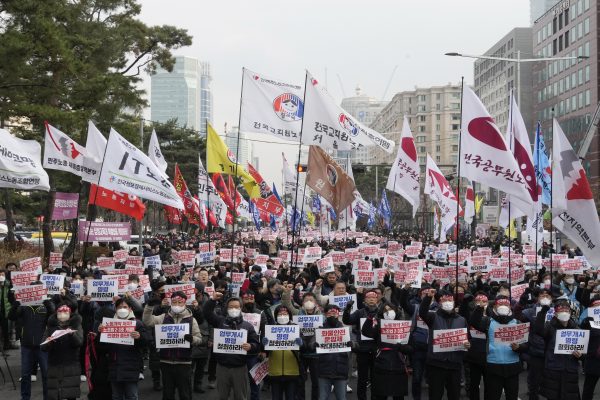
The ongoing truckers’ strike in South Korea has morphed into protests against the Yoon administration for its alleged suppression of labor rights.
Since November 24, truckers in South Korea have been on strike over the looming end of a minimum freight rate system set to expire at the end of this year. Introduced in 2020, with an expiration date of December 31, 2022, the minimum freight rate system guarantees basic wages for truckers. In the face of soaring gas prices and fuel costs, the system was set in place to prevent truckers from being overworked and overloaded, and to avoid work-related driving accidents among truckers carrying imported and exported cement and cargo goods.
The current strike is a continuation of a truckers’ strike that occurred earlier this year. During a weeklong walkout in June, the striking truckers argued that rising fuel and oil prices were threatening their livelihood, and demanded the extension of the minimum freight rate system to guarantee basic wages and prevent driving accidents. As a result of the strike, major disruptions in logistical networks all over the nation led to losses totaling over $1 billion across the steel, automobile, and other industries.
The agreement the truckers reached with the Ministry of Land, Infrastructure and Transport in June that ultimately ended the walkout remained ambiguous as to whether the minimum freight rate system would be extended indefinitely or continue to include a “sunset” provision that would allow the program to be effective only until a specified expiration date. As the December 31, 2022, expiration date for the system nears, this ambiguity is being brought to the surface in the face of worsening work conditions and rising fuel and oil prices.
With this current strike, the truckers are demanding the abolition of the sunset provision, thus pushing for the minimum freight rate system to remain in effect permanently, and the expansion of the system’s benefits to truckers carrying other cargo, like oil, chemicals, steel, and automobiles. The Yoon administration offered to extend minimum freight fares for another three years, but rejected demands to extend the program at the suggested widened scope.
The main opposition Democratic Party once urged the government to extend three more programs, but as the strikes have continued for more than two weeks, the DP announced on Thursday that it will accept the government and the ruling People Power Party’s offer. By uniting with its political rival on the issue, the DP hopes to create momentum to persuade the truckers to halt the ongoing strikes.
Similar to the June walkout, the current strike has had a negative effect on the South Korean economy, with supply chain disruptions of about $2.7 billion worth of goods across major industries, such as steel, oil refining, and cement. There have been huge delays in the deliveries of materials like cement and steel to construction sites and factories. Petrol and steel companies, including Hyundai Steel, are struggling to ship out normal volumes of their goods because of the strike.
With support from the Korean Confederation of Trade Unions (KCTU), a national trade union that includes the truckers’ union, the strike has only been expanding, as negotiations between the truckers’ union and government remain deadlocked. In a major show of support, the KCTU launched a strike on December 6 alongside the truckers’ strike. The truckers saw support from Seoul’s subway workers, whose participation in the walkout, their first strike in six years, has led to reduced train operations.
The length and broadening of the strike has led to nearly 100 petrol stations across the country running out of fuel, according to data from the Korea National Oil Corporation.
Confronted with stalled negotiations and the growing negative effects of the strike on South Korea’s key industries, the Yoon administration’s response has been aggressive. On November 29, in an unprecedented move, the government invoked its controversial powers under a law that was revised in 2004. Known as the “back-to-work order,” this compulsory order forces striking transport workers back to work, with noncompliance punishable by a sentence of up to three years in prison or fines up to $22,000. The Yoon administration issued this order for over 2,500 truckers in the cement industry on November 29, maintaining that the effect of the walkout on that industry was having disastrous impact on the South Korean economy, and arguing that the strikes themselves were illegal.
Days after its first order over the cement industry, the Yoon administration announced another “back-to-work” order for the truckers working in the petrochemical and steel industry. According to domestic media reports, this back-to-work order has been effective in resuming normal amounts of shipping, but it is unclear how many truckers returned to work after receiving the order.
Protests denouncing the government’s use of the back-to-work order occurred on December 3, with truckers accusing the Yoon administration of suppressing their labor rights. Critics called the work start order unconstitutional, since it has not made clear the conditions under which a strike would be considered legal. The government has faced immense criticism for its use of “martial law” tactics to end the strikes.
On December 6, the KCTU filed a lawsuit against the government’s invocation of the back-to-work order, demanding the retraction of the order. However, the government has vowed not to yield on what it calls illicit strikes and remains unwilling to actively engage in a dialogue unless the truckers return to work.
South Korea’s Government Accused of Violating Labor Rights Amid Truckers’ Strike
Source: Frappler

0 Comments